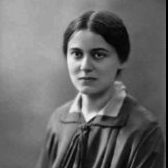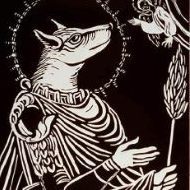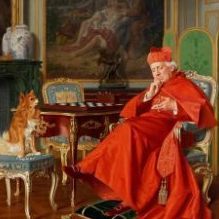-
Posts
770 -
Joined
-
Last visited
Reputation
1841 Godly
About thesmellypocket
- Birthday September 15
Contact Methods
-
Minecraft Username
TotusTuusEgoSum
Profile Information
-
Gender
Male
-
Location
Mercia, England
Character Profile
-
Character Name
Edmundus
-
Character Race
Men
-
"His entire argument resteth but on the weakest of premises: on redefining husband as active partner and wife as passive, and removing the element of the sexes. But the Flexio language doth not admit of this. For the word Vir can mean husband, but it can also mean man. And the word femina can mean simply woman, but it can also be used in the sense of a wife, especially in relation to a husband "femina sua" is used in the sense "his wife" but literally meaneth "his woman." As "Vir suus" meaneth "her husband" but literally "her man." Thus it is clear that the Flexio language clearly understandeth and defineth husband as "male" and wife as "female." This beeth naught but sophistry, a twisting of the plain meaning of the Scriptures in order to justify sins condemned by centuries of Church teaching." Writes Offa with concern to the High Pontiff, hearing of events from his trip to Churland with great distress. "The Flexio literally saith et "Ego feci caritatem viri et uxoris." Literally: "man and wife." When I return to Aevos, I must needs do all in my power to silence this madman, who has drunk the spirit of the world and the vanity of the present age over and against Divine Revelation which cometh through meek submission to His ways, rather than imposing our own desires so wantonly in this manner."
-
[RP Post to explain my absence in game for a couple of months.] Silence. Darkness. Cold. It had for Offa become more lovely than the sweetest melody, surer than the noonday sun, warmer than the Dwarven forge. He sat within the narrow confines of his cell, but it was not a monastic cell as he had perhaps dreamed of months earlier. Nor was he clothed in a monastic habit or the cassock he had hitherto worn, but it rags. For it was a prison cell. He was travelling through the midst of the darkest of nights, and found the night more lovely than the dawn, because it was the night, when the senses and affections were quieted, when the noise and tumult and glory of this world, the tide of pomp that beats upon the high shore of Aevos, could be seen in all its fraud and folly and appeared truly as it was: nothing but vanity and a lie, yes, then, then and only then, when only the light that burned in his heart guided him, could the Divine love, the Divine wisdom and the Divine knowledge, inasmuch as it were possible in this life, could make itself known. Ah - the sheer grace! He was not disillusioned by the evils that had come to him upon his return to his distant country. On the contrary, he realised the profoundest truth yet: not only did his Beloved remain with him in the darkness, but it was chiefly and most excellently in the darkness that the Beloved revealed himself. But he knew, in the deepest recess of his heart, that he must escape and return to Aevos and complete his priestly training. But not yet. Oh noche que me guiaste! ¡oh noche amable mas que el aluorada!, ¡oh noche que juntaste amado con amada, amada en el amado transformada! https://en.wikipedia.org/wiki/Dark_Night_of_the_Soul Inspired by this poem by St John of the Cross
-

TO DEFEND MANKIND | ORDER OF THE GRAND MARSHAL
thesmellypocket replied to Sean_VEVO's topic in Human Realms & Culture
"These people beeth starting a war with naught little to justify them than the accusations of daemons. They would rate it better to believe daemons than fellow Canonists. That beeth but a shallow pretext for war, revolution and schism, and they will be held accountable under the Sight of God for all the blood that must needs attend such a action. Even if such things be shown true, to do all these things on the word of a daemon, seemeth but human hotness, or e'en ibleeic envy, not divine justice." Offa states.- 8 replies
-
5
-
- burgundy
- weremakingitoutofthetrenches
- (and 4 more)
-
Offa reads the missive and gets a bad feeling due to the practice of polytheism. He warns his friends that partaking in the priestly rituals of this strange people is a sin against the virtue of religion. He asks his well-connected friend Abbess Rebecca to petition some Hierarch in the Church to decree to this effect. "Their aid may be sought in terms of natural medicine, but their rituals are not to be invoked on Canonists without, in my view, automatic excommunication on any willing participant," he recommends. "To participate in the worship of anyone but the One God is to betray the Lord, and to forsake the Canonist religion with one's actions. I cannot see it as licit for any Canonist to partake in rites wherein their gods are invoked." @Blue Bear
-
Offa was alone in the monastery at Petra when he heard the church bells ring out in riotous jubilation, a fanfare erupting such as he had never hitherto heard. Instantly, he knew it could mean only one thing. It would be impossible to describe what joy filled the heart of Offa. He had prayed in the fervour of his heart, day and night, for weeks in search of precisely this outcome. So many contrite tears, heartfelt prayers, tired hours had been poured out before his God. And God had done the right: the authors of evil had been punished, the right side had won, and the people of Adria had been spared destruction. Offa, in his ecstasy, gathered together the whole of creation in his heart and brought it before the Lord, offering a hymn of thanksgiving: 1 O all ye Works of the Lord, bless ye the Lord : praise him, and magnify him for ever. 2 O ye Angels of the Lord, bless ye the Lord : praise him, and magnify him for ever. 3 O ye Heavens, bless ye the Lord : praise him, and magnify him for ever. 4 O ye Waters that be above the Firmament, bless ye the Lord : praise him, and magnify him for ever. 5 O all ye Powers of the Lord, bless ye the Lord : praise him, and magnify him for ever. 6 O ye Sun and Moon, bless ye the Lord : praise him, and magnify him for ever. 7 O ye Stars of Heaven, bless ye the Lord : praise him, and magnify him for ever. 8 O ye Showers and Dew, bless ye the Lord : praise him, and magnify him for ever. 9 O ye Winds of God, bless ye the Lord : praise him, and magnify him for ever. 10 O ye Fire and Heat, bless ye the Lord : praise him, and magnify him for ever. 11 O ye Winter and Summer, bless ye the Lord : praise him, and magnify him for ever. 12 O ye Dews and Frosts, bless ye the Lord : praise him, and magnify him for ever. 13 O ye Frost and Cold, bless ye the Lord : praise him, and magnify him for ever. 14 O ye Ice and Snow, bless ye the Lord : praise him, and magnify him for ever. 15 O ye Nights and Days, bless ye the Lord : praise him, and magnify him for ever. 16 O ye Light and Darkness, bless ye the Lord : praise him, and magnify him for ever. 17 O ye Lightnings and Clouds, bless ye the Lord : praise him, and magnify him for ever. 18 O let the Earth bless the Lord : yea, let it praise him, and magnify him for ever. 19 O ye Mountains and Hills, bless ye the Lord : praise him, and magnify him for ever. 20 O all ye Green Things upon the Earth, bless ye the Lord : praise him, and magnify him for ever. 21 O ye Wells, bless ye the Lord : praise him, and magnify him for ever. 22 O ye Seas and Floods, bless ye the Lord : praise him, and magnify him for ever. 23 O ye Whales, and all that move in the Waters, bless ye the Lord : praise him, and magnify him for ever. 24 O all ye Fowls of the Air, bless ye the Lord : praise him, and magnify him for ever. 25 O all ye Beasts and Cattle, bless ye the Lord : praise him, and magnify him for ever. 26 O ye Children of Men, bless ye the Lord : praise him, and magnify him for ever. 27 O let Oren bless the Lord : praise him, and magnify him for ever. 28 O ye Priests of the Lord, bless ye the Lord : praise him, and magnify him for ever. 29 O ye Servants of the Lord, bless ye the Lord : praise him, and magnify him for ever. 30 O ye Spirits and Souls of the Righteous, bless ye the Lord : praise him, and magnify him for ever. 31 O ye holy and humble Men of heart, bless ye the Lord : praise him, and magnify him for ever. 32 O Horen, Malin, Urguan and Krug, bless ye the Lord : praise him, and magnify him for ever.
- 75 replies
-
1
-
- gg
- war is over
-
(and 1 more)
Tagged with:
-
In light of the coming battle, Offa continues his penance on behalf of the Adrian people in the catacombs of the church at Veletz, hoping that even in the inevitable defeat which was to come, the victors would not utterly wipe out the Raevir peoples from the earth, and that the people would be spared. He had heard that the Adrians had been labelled an "accursed race" and therefore that their enemies planned to destroy them utterly. He was sympathetic to Covenant cause but still did not want to see the destruction of the Adrians.
- 21 replies
-
- three more to go
- the final stretch
-
(and 1 more)
Tagged with:
-
"vos non crispate manus in ira, neque in invidia, neque in aliis peccatis." Liber Virtutis, V, IX. The purpose of this thesis is not to discount all forms of righteous anger, or all forms of violence. But it is to offer some cautions about the excesses I believe many in the Church have fallen into. It would be of course wholly wrong to condemn the Flamenist school wholesale. But an exaggerated distortion of the Flamenist school which is not balanced by faith and reason, and, above all, charity, can be spiritually ruinous for many, especially those that love anger and violence. In this I do not less than the Prophet Horen himself who said: "Raise not your hands in anger, nor in envy, nor in any other sin." Or in Owyn who said, disapprovingly: "For I find you seek power in wrath." And: "You have conjured up...A vengeful host." I. The Origin of Anger. From Thence Proceedeth Danger. That Vengeance Belongeth to God. Owyn slayeth Harren. Appearances of Anger in Scripture: All Negative. I.THE FLEXIO WORDS "Ira" and "indignatio", both translated as "wrath" or "vengeance" appear many times in the Sacred writings. We find that in the vast majority of cases, they appear in a negative way: turning people away from God, causing sins that cry to Heaven for vengeance, and undermining virtue and unity. For example, the words interpreted as "wrath" (ira and indignatio) appear five times in the Scroll of Gospel, and all 5 times, they appear as an evil thing. They cause sin, schism and weakness in the body of mankind, and drive the descendants away from the path of virtue. Krug's ira is seen as a curse inflicted upon him by Iblees, a curse that is tempered, but not removed, by valour. Even in the Scroll of Auspice, where, in the victory over and destruction of evil, we would expect to see anger in a better light, even there it is portrayed as a temptation from the Enemy for mankind. I believe that this prophecy is always being fulfilled inasmuch as the way of anger and wrath represent a temptation ever-present before the eyes of the Church. Origin of Anger II.What is the origin and definition of anger? Anger may be understood as a passion of the sensitive appetite. It is essentially may be defined as the desire for revenge. When we perceive an injury to ourselves or others, we desire justice. We desire that this wrong be avenged. Now this desire is not always illegitimate, since it is lawful, in accordance with right reason, to punish injustice. It becomes sinful when it is sought to wreak vengeance upon one who has not deserved it, or to a greater extent than it has been deserved, or in conflict with the dispositions of law, or from an improper motive. Likewise, anger is sinful when there is an undue vehemence in the passion itself, whether inwardly or outwardly. Anger can be coloured by envy, which is a sorrow at another's good. We perceive that another has a good that we think belongs to us. And thus, anger is often a fruit of envy. Dangers of Anger III.The danger comes from the fact that our passions are not in accordance with reason, and often contrary to charity. Those who act in anger often claim to be acting as instruments of God's vengeance, righting the wrongs of the nation and world, working for God's justice. But the question is: when does God's justice end and MAN's anger begin? It seems to me that we should be very cautious about using anger, as any passion. The many times in Scripture when the anger of Man and the descendants caused grave evil are witness to this danger. Even Owyn fell to kinslaying due to anger. Now, the question is: Are you greater than Owyn? And if anger was strong enough to make Owyn fall into grave sin, what chance do YOU have of ruling it? If Owyn could not walk the thin line between justice and anger, can you? Owyn sought God's justice; he instead worked Owyn's anger, and thus perverted God's justice. Thus it is evident that the anger of man worketh not the justice of God. Any man who indulges in anger is playing with fire and is prone to sin. And I have noticed that Men engaged in political affairs often use God's justice as a justification. They write God's Name in their fancy titles but refuse to show His mercy to any; they exercise their own anger and desire for revenge and claim that it is God's anger, not their own. IV.This is almost more true with righteous anger, that is, when the injustice suffered is real and not merely perceived, and the desire for anger proceeds from a desire for good, than with anger that is purely iniquitous. For if a man perceive that he or another hath been injured, and is convinced that he is in the right, then for him to temper his anger is even more difficult, because he will justify his rage to himself. Thus, anger can lead to an increase in pride, in which we make ourselves judge, jury and executioner of others. We believe that we are the agents of justice and that we can revolt against superiors, crush inferiors and destroy equals. V.And as I have hitherto explained, the line is thin between acting rightly out of justice, and acting purely on the basis of passion or an inordinate desire for revenge. This desire for revenge's greatest danger is that it is without mercy. It is the nature of mercy to pardon and spare; but how can one consumed with thoughts of revenge act in accordance with mercy? Thus the revolt and pride of anger becomes a revolt against the very mercy of God. We Recognise that None Stand Upright Before God VI.One Psalm in the Liturgy of the Churlish Monks saith: "If Thou, O Lord, wilt be quick to mark what is done amiss, who would stand it?" Thus, we know that if God acted according to the fullness of the vengeance whereby He might punish, we would be altogether destroyed. However, we ask that God spare us His anger and give us instead His mercy. This recognition of our own sinfulness before God can be a potent remedy against anger. For realising one's own frailty, he will be less keen to condemn others: for if he ask that sinners be utterly destroyed, he is petitioning against none other than himself. St. Pius of Sutica cautions against this type of anger when he wrote: "I have since learnt this: that any man who refuses to pity his brother when he falls into a serious fault, shows himself to be in great danger of an imminent fall himself. For pride refuses to admit weakness, and hence, as a hot-headed general is easily lured into ambushes, so Iblees can easily overcome those who are assured of their own strength. I do not mean we should not punish transgressors because we ourselves are guilty; but even there we should say: “Thank God I have not done worse”, and punish as men who hate sin, but love sinners. Even when the order of society necessitates the death penalty, Confession should on no account be neglected to be offered to the criminal, so that he who was failed according to the justice of men, might triumph according to the mercy of God - Thy mercy, which endureth forever."-Confessions, Book 1, 4.9. VII.The basic principle is this: he who refuses to show mercy will not have mercy shown him. Conclusion: It is better to err on the side of mercy. IX.I will end this thesis with a practical note. How can we know where to draw the "thin line" between anger and justice, as I have indicated? I cannot answer this in a short thesis, but I can provide a useful tool for discernment: that it is better to err on the side of mercy and gentleness. That is, it is better to come before the Judge and have to face the flaw of being too gentle than having been too severe. Put away anger: but show yourselves courteous, honourable, modest, merciful, humble and pure. Exercise yourselves by putting on the bowels of justice, gentleness and sweetness.
-
I want you to know that I read your posts in Bishop Sheen's voice
-
Offa of Evesham tires of barred gates.
- 23 replies
-
4
-
- covenant
- come with me
-
(and 3 more)
Tagged with:
-
IN-CHARACTER Name: Offa of Evesham Age: 24 Race: Human (Churlish) Service: Priest Where do you wish to serve?: Haense OUT-OF-CHARACTER Username: TotusTuusEgoSum Discord: totustuusegosum
-
"Just because God be'th beyond human reason, it doth not follow that all religious claims are automatically erroneous; nor doth it follow that Man cannot receive Divine Revelation. For whilst all religious language ultimately falleth short of the Godhead, it really doth still pertain to Him; since God is the Author of both reason and visible and invisible creation. The Creator may be known from creation; the painter may be known by his painting. Not comprehended, but known in a certain limited way. And so it be an imperfect knowledge, through a glass, darkly..." Responds Offa. "Hence from the knowledge of sensible things the whole power of God cannot be known; nor therefore can His essence be seen. But because they are His effects and depend on their cause, we can be led from them so far as to know of God whether He exists, and on to know of Him what must necessarily belong to Him, as the first cause of all things, exceeding all things caused by Him."
-
"What have the Sons of Men forgot?" Laments Offa. "It beeth not so much about whether the Duke b'th sincere or not, or it beth that but in part. For if this war beeth feoht to its last drop, many innocents schael perish, as wars do occasion. Can the persecutors of war in troth say that, once the Duke hath reconciled with the Church, that there b'th a cause weighty enough to outweigh the evils that war must needs occasion? Can any say thus?"
- 32 replies
-
4
-
- w xarkly (ghost writer)
- it aint over till i say its over
- (and 1 more)
-
Offa, still staying at the monastery in Petra, found comfort in the Venerable Cardinal Boniface's Thesis on War and Mercy. "Boniface sought peace, not necessarily for the sake of the wrongdoers themselves, but for the sake of all the ordinary innocent people caught in the matter. For while it is a legitimate good to dethrone the wicked, there are also those bound by ties of nationality, fealty and family to fight alongside or under evil men, who must needs also be swept under. Thus good men seek peace for their sake. Ultimately many thousands of innocents die in war, and its continuation only in the rarest instance can be accounted an evil worth suffering in proportion to any good attained. P.S. My writing in standard Common seems to be improving. P.P.S. I apologise for not following on into your service as I desired. I am currently at the monastery since I was recently baptised and seeking to learn more about Canonism. Please keep me in your prayers." He writes (in his best formal, non-Churlish Common) to his friend Walter Weiss. @SethWolf












.thumb.jpg.8a3d0b12e416957121adf45594bba83c.jpg)







